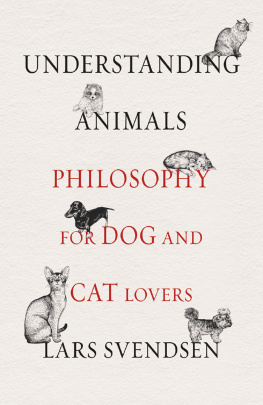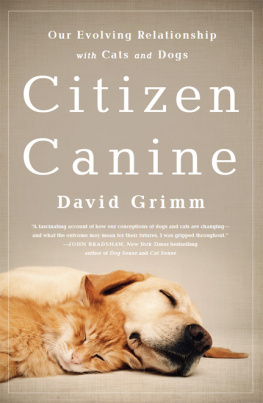
1
HOW IT MAY HAVE STARTED
Some show that nice sagacity of smell,
And read with such discernment in the port
And figure of the man, his secret aim
That oft we owe our safety to a skill
We could not teach and must despair to learn.
Cowper
Through the tall grass of the plain a little group of people makes its way, an unclothed, uncivilized band. They are certainly human beings like ourselves, their build no different from that of present-day man. In their hands they carry bone-tipped spears, some even have bows and arrows, but in their behaviour there is something which would be foreign even to present-day savages of the lowest cultural type, and which would strike a modern observer as being an animal trait. These men are no lords of creation that look fearlessly out into the world; instead, their dark eyes move to and fro restlessly as they turn their heads, glancing from time to time fearfully over their shoulders. They remind one of deer, hunted animals that must always be watchful. They give wide berth to bushes and the taller vegetation of the steppes which may easily shelter a large beast of prey, and, as on one occasion, a big antelope breaks cover with a loud rustling, they start nervously, hastily adjusting their spears for action. The next moment, recognizing the harmlessness of the animal, their fear gives place to relieved but excited chatter and finally to hilarious laughter. But this cheerful mood soon subsides: the band is downcast and with good reason. In the course of the last month, they have been forced by stronger, more populous tribes, to relinquish their original hunting grounds for the plains of the West, a country which they do not know and where large beasts of prey are much more prevalent than in the abandoned territory. The knowing old hunter who was their leader lost his life a few weeks ago; he was wounded by a sabre-toothed tiger which tried one night to steal a young girl from the band. In a fever of excitement, all the men set their spears at the tiger, the leader at their head, but unluckily it was he that received the brunt of its attack. The girl was already dead and the leader died of his wounds the next day. The fact that the tiger also died a week later of peritonitis caused by a spear wound in his abdomen was of small direct advantage to the little band of people. This now consisted of but five grown men, the rest being women and children, and five men are not enough to beat off the attacks of a large beast of prey. Nor is the man who has assumed the leadership so endowed with experience and muscle-power as was the former leader. But his eyes are brighter and his forehead higher and more arched than that of the other. The depleted group suffers most from lack of sleep. In their own territory they used to sleep round the fire and, moreover, they possessed a guard of which, till now, they were unaware. The jackals that followed in the tracks of the human hordes, scavenging the refuse from slaughtered animals, surrounded their camp at night in a close circle. No feelings of friendship united the humans with their troublesome followers. Missiles greeted every jackal that dared approach too near the fire, and occasionally an arrow was aimed at them, though it was seldom that one was wasted on such unappetizing creatures.
Even to-day, in the eyes of many peoples, the dog is still marked out as an unclean animal in consequence of his disreputable ancestors. Nevertheless, the jackals were a definite help to the human beings whose footsteps they followed: to some extent, they saved them the trouble of setting a watch, since the clamour they set up on the approach of a beast of prey announced from afar the appearance of the marauder.
These primitive human beings, careless and unthinking, were unaware of this usefulness of their four-legged retinue; but now that it was missing, the uncanny stillness around the camp was so sinister that even those who were not entrusted with the watch hardly dared to close an eye; and this proved most exhausting, since their vigilance was already overtaxed owing to the small number of able-bodied men that their band included. And so the little company, tired and nervous and thoroughly disconsolate, pursued its way, jumping at every sound and seizing its weapons, and now very seldom bursting into guffaws when the alarm proved to be a false one. At the approach of evening, the dread of the coming night began to weigh heavy on every mind; they were obsessed by that fear of the unknown which, engraved in bygone eras into the convolutions of our brain, renders even to-day the darkness of night a source of terror to the child and, to the adult, the symbol of all things evil. This is an age-old memory of the time when the powers of darkness, in the form of flesh-eating beasts of prey, sprang out of the night upon human beings. For our forefathers the night must indeed have held unlimited terrors.
The silent group of people presses closer together and begins searching for a place far from any bushy cover, where they will be safe from the attack of predatory beasts. Here, by a slow and tiresome procedure, they will light their camp fire and roast and divide the meagre spoils of the day. The repast consists to-day of the already high remains of a wild boar, the leavings from the meal of the sabre-toothed tiger, from which the men had driven off, after a struggle, a pack of hyena dogs. Such a mutilated carcase would hardly seem appetizing to us but the members of the band cast hungry looks at their leader who is carrying the half-eaten skeleton himself in order to save any less responsible person from temptation. Suddenly the footsteps of the band halt as if at an order. All heads are turned in the direction whence they have come and, like a herd of startled deer, they all focus their senses in that one direction. They have heard a sound, the call of an animal which, strangely enough, brings no threat with it as most animal calls do: for only the hunting animal gives tonguethe hunted have long ago learned to be silent. But this sound seems to the wanderers like a message from home, a reminder of happier and less dangerous times, for it is the howl of a jackal. It almost seems as though the band, in its child-like, almost ape-like impulsiveness, will hurry back in the direction whence the howling proceeds. Strangely moved, they stand in anticipation. Then suddenly the young leader with the high forehead does something remarkable and, to the others, inexplicable: he throws the carcase to the ground and begins to rip off a large piece of skin to which some flesh still adheres. Some young members of the band, thinking that a meal is about to be distributed, come close, but with furrowed brow, the leader repulses them with a deep grunt of anger. Leaving the detached pieces of meat on the ground, he picks up the rest of the carcase and gives the signal for marching. They have hardly advanced a few steps when the man who stands nearest the leader in rank, and who is physically stronger though mentally less active, challenges him, indicating with his eyes and with head movementsnot, as we would do it, with the handsthe abandoned piece of meat. The leader reproaches him and presses onward. After another ten yards, the second man falls back and moves towards the meat. The leader, throwing his booty into the grass, pursues him and, as the other raises the reeking flesh to his mouth, he rams his shoulder against him causing him to totter sideways. For a few seconds the two face each other threateningly, their foreheads puckered, their faces distorted with rage; then the second man drops his eyes and, muttering, follows the group, which is now once more in motion.











